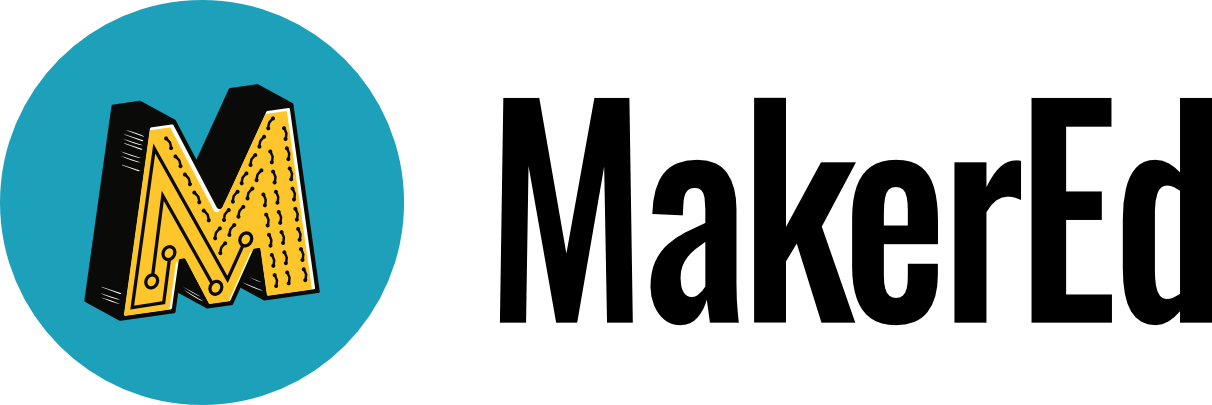Earlier this week, Maker Ed’s Open Portfolio Project convened its core leadership team, along with five of its fantastic National Working Group members, at Indiana University in Bloomington, IN to meet in-person for a two-day workshop. The attending NWG members represented DIY.org, Project Zero’s Agency by Design under Harvard’s Graduate School of Education, the National Writing Project, Envision Schools, and Solve for Pattern.
The Open Portfolio Project, a 15-month project funded the Gordon and Betty Moore Foundation, seeks to develop a set of recommendations around a common set of practices for portfolio creation, reflection, sharing, assessment, and technology solutions, resulting in an open, decentralized, and distributed lifetime portfolio system for makers. This effort is in collaboration with Indiana University’s Creativity Labs, led by Dr. Kylie Peppler, and it is also supported by an incredible group of National Working Group members, who represent organizations and fields across arts and science education, technology, making, entrepreneurship, formal and informal schooling, and educational research. Through monthly Hangouts and a Google+ community, their input and experiences help to inform and advise our work and approaches.
 In Bloomington, we gathered in frigid winter weather at the gorgeous granite Indiana Memorial Union to make and discuss. The first design workshop had members making LED cards – and documenting their process! Afterwards, from a personal first-person perspective, we all reflected on the project and challenges of documenting. When did we take photos or video, what did we record in writing, and what do those really demonstrate? Documentation is active, and if it shifts from first-person documentation to third-person, what is or isn’t captured in the process? We recognized that, in many ways, making a portfolio is another layered making activity to the primary project.
In Bloomington, we gathered in frigid winter weather at the gorgeous granite Indiana Memorial Union to make and discuss. The first design workshop had members making LED cards – and documenting their process! Afterwards, from a personal first-person perspective, we all reflected on the project and challenges of documenting. When did we take photos or video, what did we record in writing, and what do those really demonstrate? Documentation is active, and if it shifts from first-person documentation to third-person, what is or isn’t captured in the process? We recognized that, in many ways, making a portfolio is another layered making activity to the primary project.
These discussions segued into an afternoon design workshop on focused more on portfolio prototypes. With specific users (and thus needs) in mind, such as the reluctant 16-year-old high schooler, the 11-year-old girl engaged in rainbow looms, or the eight-year-old in a making afterschool program, we worked on thinking through what would be necessary to help motivate and facilitate their documentation and portfolio creation. Are there social factors involved? Do youth need an initial prompt, push, or purpose? What level of personalization is useful? How high-tech or low-tech do the tool(s) need to be? How can we capture the story and the processes?
The first phase of the project included a thorough literature review of portfolios and e-portfolios and their use across various fields and disciplines. In digging through the literature, a number of themes and key questions have arisen around how identity is formed and represented in portfolios and documentation, what role reflection plays, and of course, how portfolios can be assessed.
In many of our monthly meetings, these exact topics were discussed, and in our Bloomington in-person meeting, additional questions were brought up around best practices for integration of portfolios, motivation for documentation, training and development for the educators and facilitators working with youth, and the capture of both the process and artifacts of making.
The meeting also marked the transition from phase 1 to phase 2, in which we will be conducting field research and observing educational programs to learn more about the existing practices and tools that they employ. We may be able to identify features (or wishes!) that best promote learner documentation, reflection, and curation, as well as test potential prototypes.
OPP, as some of us like to refer to it, is an exciting and timely project that brings to the surface important questions we’re all investigating. We’re thrilled to be collaborating with such a broad and deep group of experts, and we hope to learn a tremendous amount more as we step out into the field and work closely with practitioners and youth in the upcoming months. Many thanks to all of those who trekked to (and hosted us in) Bloomington!



Leave a Reply